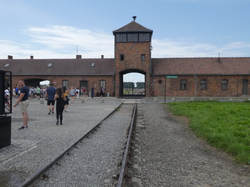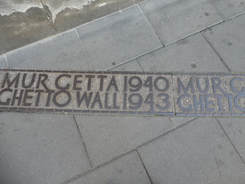 I was in Warsaw earlier this month to give a talk at the IAJGS conference on Jewish genealogy, which provided an opportunity to visit this fascinating country. Agonising glimpses of once vibrant Jewish communities abound, but it is the sense of what has been lost that is palpable everywhere. I cannot remember when I first became aware of the Holocaust. Most likely it was when, at the age of 13 or 14, my mother gave me a second-hand copy of The Diary of Anne Frank. Later, at 19, I visited Yad Vashem, the Holocaust memorial museum in Israel. Strangely I don’t remember being shocked by either of these (although I do recall a feeling of nausea at the piles of shoes at Yad Vashem); perhaps I felt that they confirmed information I had already absorbed. As an adult, books by Primo Levi and other survivors, including an absolutely chilling account of the workings of Treblinka by Chil Rajchman, broadened my knowledge. Yes, the details are sickening, but familiarity with the events of the Holocaust has become so universal that I’m not sure it is ever possible to really imagine the enormity of what happened in Europe in the early 1940s.` Visiting Poland certainly brought the horror home to me. One day my husband and children went to the Wieliczka salt mines, while I visited Auschwitz. Beforehand, I tried to explain to my eight-year-old daughter why I was not going with them. I only told her the most basic elements, but her face wrinkled up and she told me to stop. That night, frightened by my stories, she was unable to sleep. The tour of Auschwitz-Birkenau, conducted by a guide whose great-grandfather had survived the camps, was haunting. Appalling, gruesome, sickening….there are no words that can do justice to the horrors perpetrated there. The visit is something everyone should experience. It records events that should never be allowed to happen again. And yet humanity does not seem to learn. Since then, ethnic cleansing has been perpetrated in former Yugoslavia, in Rwanda, in Darfur, in Myanmar and elsewhere. And the far right has experienced a resurgence across much of Europe. Most shocking though, was the sense of absence. In Krakow and in Warsaw, both cities with large pre-war Jewish communities – around 60,000 in Krakow and 400,000 in Warsaw, around a quarter and a third of the population, respectively – the loss is palpable. In Krakow, several vestiges of the old Jewish quarter remain – synagogues turned into museums; a cemetery where one wall has been built using fragments of gravestones shattered by the Nazi occupiers; shop fronts adorned with the names of their Jewish former owners. Indeed there is something of a revival of Jewish culture and heritage, with concerts of klezmer music, a Jewish festival and the Israeli ‘Hummus and Happiness Bar’, as well as a museum of photographs documenting the area’s Jewish life and loss.  In Warsaw it is the dearth of remnants of the Jewish community that is so chilling. The Germans razed the city to the ground as they fled the approaching Soviet troops. This makes the tiny fragments that remain all the more shocking: a single street that survived the demolition of the ghetto, pockmarked with bullet holes; a narrow fragment of ghetto wall; a synagogue that miraculously survived – one of over 400 that used to exist in the city; metal strips traversing the pavement at intervals, marking where the wall stood from 1940 until the ghetto was liquidated in 1943, when its inhabitants were herded onto cattle trucks and sent to the death camp at Treblinka. And, in the sparkling new Jewish museum, exhibits marking hundreds of years of Jewish life in Poland come to an end not during the war, but afterwards, when the remaining few Jewish survivors returned to their villages to be welcomed not with sympathy and understanding, but with rampant anti-Semitism and fresh pogroms. The foundation of the state of Israel provided the escape that the remaining Jews needed, and they fled, en masse, in 1948. Only in recent years have a few Jews begun returning to Poland, to rebuild their lost culture and commemorate those who have been long forgotten. Of course anti-Semitism is still rife among some sections of society, indeed a recent law making it a crime to accuse the Polish nation of complicity in Nazi war crimes prompted international condemnation. But there is a sense that many are now celebrating and commemorating Poland’s Jewish past, rather than smothering it.
3 Comments
Coral Grant
11/8/2018 07:18:47 pm
So well said. I too was in Warsaw, Krakow and Auschwitz this week after speaking at the IAJGS2018 Conference. My experience was soul breaking and I absolutely agree.
Reply
22/6/2020 07:47:34 am
Hi Lisa,I am Florence Marr's older brother. I am a retired surgeon(20 yrs) I unfortunately didn't have a chance to see or talk to you. when you were in Wpg. I was practicing in Saskatoon SK. I of course knew your dad Morley very well and my aunt Pearl and uncle Izzy. I lived at the "Trib Inn" while studying for my Bar Mitzvah.. Also read your book.
Reply
Leave a Reply. |
Keeping stories aliveThis blog aims to discuss historical events relating to the Jewish communities of Ukraine, and of Eastern Europe more widely. As a storyteller, I hope to keep alive stories of the past and remember those who told or experienced them. Like so many others, I am deeply troubled by the war in Ukraine and for the foreseeable future, most articles published here will focus on the war, with an emphasis on parallels with other tumultuous periods in Ukraine's tragic history. Archives
March 2024
Categories
All
|
 RSS Feed
RSS Feed
